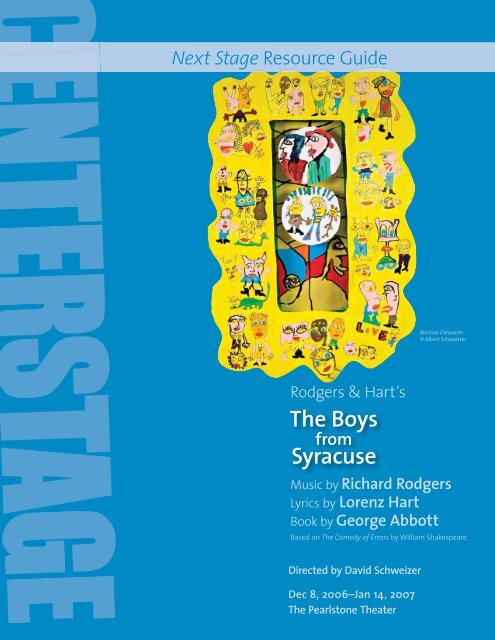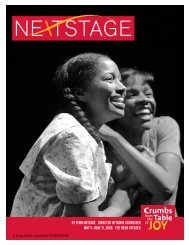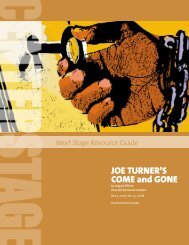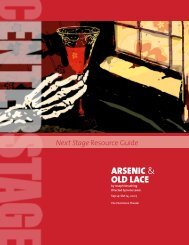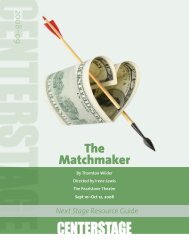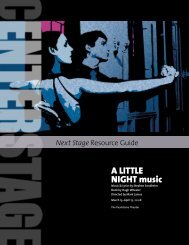The Boys from Syracuse - Center Stage
The Boys from Syracuse - Center Stage
The Boys from Syracuse - Center Stage
- No tags were found...
Create successful ePaper yourself
Turn your PDF publications into a flip-book with our unique Google optimized e-Paper software.
SETTING THE STAGE<strong>The</strong> <strong>Boys</strong> <strong>from</strong> <strong>Syracuse</strong> by Rodgers, Hart, & Abbottby Shannon M. Davis, Publications AssociateCharacters:Antipholus of <strong>Syracuse</strong>Dromio of <strong>Syracuse</strong>, his servantAntipholus of EphesusDromio of Ephesus, his servantAn assortment of merchants, wives,maybe-wives, courtesans, servants, and citizens.Have you ever wished you had a twin?Wanted to be someone else?Felt like a stranger in your own city?Antipholus knows how you feel. He’s stuck in Ephesus—sworn enemy of his native <strong>Syracuse</strong>—searchingfor his long-lost twin brother and coming up empty. His servant, Dromio, has had equally bad luckfinding his own twin as well, and wants nothing more than to go back home. Yet everyone seems toknow them—including wives they never knew they had. To confuse matters even further, prospering inEphesus are another Antipholus and Dromio, who’d be happy if not for a little woman trouble of theirown. Comic mayhem fills the streets as confusion overcomes everyone—and the citizens of Ephesusburst into a song-and-dance number gleefully announcing the upcoming execution of a trespassingcitizen of <strong>Syracuse</strong>.Sound like fun? It should; it’s one of the oldest stories in the book. In their archetypal ‘30s musical,<strong>The</strong> <strong>Boys</strong> <strong>from</strong> <strong>Syracuse</strong>, classic American theater duo Rodgers & Hart created a witty frolic throughsmall-town Asia Minor, where two pairs of separated-at-birth identical twins seem destined never tofind each other while stumbling into plenty of trouble on the way. Though you may be most familiarwith Shakespeare’s Comedy of Errors, <strong>from</strong> which George Abbott adapted this irreverent caper, the plotelements show up over a millennium earlier in the Roman farces of Plautus. Slapstick humor and farcicalantics have always been popular; as Shakespeare—and Rodgers & Hart—discovered, a little refurbishingis all it takes to jazz up an old standby.Part of the challenge of theater comes <strong>from</strong> reinterpreting classic works so that they continue toresonate with theatergoers. In this case, a story thousands of years old is updated with screwball ‘30sflair—recalling the sophistication of pre-War Broadway, where raucous comedy and sparkling gracedanced hand-in-hand.And like all the classics, it still has plenty to teach us. While running (or not running) into a long-lost twinmight not be something most of us worry about, who hasn’t needed to laugh at the chaos wrought by asimple misunderstanding? ●Next <strong>Stage</strong>: <strong>The</strong> <strong>Boys</strong> <strong>from</strong> <strong>Syracuse</strong> | 3
Richard Charles Rodgers(1902–1979)Rodgers graduated early <strong>from</strong>Columbia University; by age 17 hewas collaborating professionallywith Lorenz Hart. For two decades,the two created some of thefinest musical comedies of theirtime. When Hart’s drinking madefurther collaboration impossible,Rodgers teamed up with OscarHammerstein II. Beginningwith the Pulitzer Prize-winningOklahoma! in 1943, together theymade the integrated musical playinto the world’s most popularform of commercial theater, usingsongs as dramatic tools to enhanceaction and character developmentin entirely new ways. With a careerspanning 60 years and more than50 musicals for stage and screen,Rodgers and his songs remain keyelements of the modern musicalvocabulary.Lorenz Hart(1895–1943)New York native Lorenz “Larry”Hart’s witty, intricate andsometimes cynical lyrics foundtheir perfect counterpoint in therich melodies of Richard Rodgers—his only professional songwritingpartner. Teaming up while studentsat Columbia University, Rodgersand Hart won attention with thehit song “Manhattan.” <strong>The</strong>y wenton to write 29 stage musicalstogether, as well as contributingsongs to a dozen films. Unhappywith his appearance and unable toaccept his own homosexuality, Hartdrank himself to an early death, butlyrics to such gems as “My FunnyValentine,” “Blue Moon,” “Where orWhen,” and “Bewitched, Botheredand Bewildered” show him at hisbittersweet best.George Francis Abbott(1887–1995)Universally known as “Mr. Abbott,”this legend lasted more than acentury. His first success came asa playwright, but he went on tobecome a sought-after librettistfor musical comedy and one ofthe most successful directors andproducers in Broadway history. Hissignature was speed, but he alsointroduced such innovations asauditions for actors, and helpedpioneer the role of choreographyin musicals. His musical comedycareer began in 1935, co-directingfor Rodgers and Hart; the trioteamed up for three more hitshows: On Your Toes, <strong>The</strong> <strong>Boys</strong> From<strong>Syracuse</strong>, and Pal Joey. When hedied, at 107, he had just helpedrevise and revive Damn Yankees forBroadway.Adapted <strong>from</strong> Who’s Who in Musicalsby John KenrickNext <strong>Stage</strong>: <strong>The</strong> <strong>Boys</strong> <strong>from</strong> <strong>Syracuse</strong> | 8
BurlieANABBREVIATEDHISTORYOF THEBy the late 1930s, the traditions ofvaudeville and burlesque were wellestablished in the US. Indeed, afterflourishing for 50 years, they actuallyteetered on the edge of decline; whatworldwide Depression hadn’t killed,radio and movies helped finish off.When <strong>The</strong> <strong>Boys</strong> <strong>from</strong> <strong>Syracuse</strong> firstlanded on the Great White Way, itboasted a cast including some genuineveterans of the vaudeville circuit—folkslike Jimmy Savo, one of the Dromios—and played to an audience raised onand steeped in the form. <strong>The</strong> likes ofJackie Gleason, Fanny Brice, Bert Lahr,Al Jolson, Charlie Chaplin, Cary Grant,Buster Keaton, W.C. Fields, Bobby Clark,Red Skelton, Abbottand Costello, the MarxBrothers, Phil Silvers,Bob Hope, RobertAlda, Fred Astaire, andMae West all got theirstart as burlesquers orvaudevillians, alongsidesuch greats as GypsyRose Lee, Lili St. Cyr, SallyRand, and Baltimore’sown Blaze Starr.As many have observed,burlesque, more thanvaudeville, was the true“break-in ground” whereBaltimore Burlesque amateurs could proveQueen Blaze Starr they had the talent anddoes her part to determination to survivesupport CENTERSTAGE in show business. By theduring a fundraiser. time most performersreached vaudeville, theywere already experiencedpros. It was supposedto be a one-way trip; vaudevilliansconsidered it a fatal disgrace to appear inburlesque, insisting that only those whowere washed up would stoop so low.However, many a vaudeville veteran hitthe burlesque wheels during dry spells,appearing under an assumed name.Burlesque comedy was built aroundsettings, situations familiar to workingclassaudiences. Courtrooms, streetcorners, and schoolrooms were favorites,as were examining rooms ruled overby quack doctors or the offices of hacklawyers. If a joke didn’t work, the ensuingrain of produce left no doubt of the fact,and the comedian either revised or gotcancelled. Burlesque made no pretenseto an overall organization nor to anyelevated sensibility; coarse gags, sexualinnuendo, sly puns, and physical humorwere the staples of a succession of shortbits or turns, alternating with songsand novelty acts. <strong>The</strong>se might featuremagicians, jugglers, animal acts, acrobats,or material familiar <strong>from</strong> sideshows andcircuses. Chief attraction, though, werethe ladies—the “peelers”—who cameout in various stages of undress andproceeded to get more so.Treading that fine line between titillationand exhibition, between the suggestiveand the merely illegal, led to greatingenuity. <strong>The</strong>re were fan dancers andacrobats, or the comically intellectualmonologue performedwhile stripping. <strong>The</strong>rewere exotic dancers <strong>from</strong>a mysterious, imaginaryEast, like the legendaryLittle Egypt. <strong>The</strong>rewere sly parodies ofhigh culture, <strong>from</strong>Shakespeare toGilbert and Sullivan.Gradually, the stripteasebecame the centerpiece of burlesque,with the other acts merely additionsto lend a semblance of decorum—likethe pasties adorning the performersthemselves.Vaudeville differed little, chiefly inlacking the explicit titillation of thestriptease. Also essentially a variety show,vaudeville may have offered a few morepretensions to literacy and culture, butessentially it rested like burlesque onthe talents and appeal of comedians,Next <strong>Stage</strong>: <strong>The</strong> <strong>Boys</strong> <strong>from</strong> <strong>Syracuse</strong> | 9
-Q<strong>The</strong>jugglers, ventriloquists, fireswallowers,knife-throwers, acrobats,magicians, and their assortedcohorts. Parodies were popular andimmediacy in vogue, though therewas an equal propensity—as in thecase of <strong>Boys</strong>—to provide a literaryor classical frame of some kind.<strong>The</strong> unquestioned and absolutemonarchs of the vaudeville circuit,whom mighty legends like W. C. Fieldsand Fred Allen refused to follow onstage, were the Marx Brothers. <strong>The</strong>yhad some of everything, a completevariety show in one act, and weremasters at it. To watch their filmstoday is to see a time capsule ofvaudeville: pantomime, dialectcomedy, music, singing, dancing,romantic light comedy, ethniccomedy, sketch comedy, acrobatics,puns, parodies, and so much more.Legal crackdowns on burlesquebegan in the mid-1920s, including anow legendary raid on Minsky’s inManhattan. Reform-minded MayorFiorello LaGuardia closed New York’sremaining burlesque houses in 1937,dismissing them as purveyors of“filth.” <strong>The</strong> vaudeville circuit, wheretop acts had commanded $1,000 aweek, was also fading fast. Veteranssegued into radio, film, or television,taking many classic routines withthem—where in sitcoms andtalkshows and other forms, theyendure still. But in <strong>The</strong> <strong>Boys</strong> <strong>from</strong><strong>Syracuse</strong>, we get a glimpse backto that last lingering moment, amarriage of low-down burlesquevariety acts with the evolving geniusof the musical theater.Adapted <strong>from</strong> A History of theMusical by John KenrickTHE BLOCK:“You can always make the nut in Baltimore”When producers of vaudeville or burlesquewanted to make some quick, guaranteedmoney and try out a new show on the road,they came to Baltimore. This 1952 articleby Stephen Hull, <strong>from</strong> the racily titledAmerica’s Cities of Sin, hints at why.oldest, lushest, bawdiest tenderloin in theUnited States today is that back-of-the-waterfrontarea of Baltimore, Maryland, known as <strong>The</strong> Block.Actually the district covers about three blocksalong East Baltimore Street…a garish, neonlitartery dotted with burlesque shows, pennyarcades, tattoo parlors, saloons, cheap hotels,fifth-rate movies, night clubs, and shootinggalleries. This low-down amusement sector roarsfull blast <strong>from</strong> mid afternoon to 2am. At that timethe legal closing hour for the sale of liquor jetpropelsthe customers <strong>from</strong> the strip-tease jointsout on to the street to pick up girls and taxi offto the broad minded hotels in the neighborhood,or to the dives around lower Broadway whereafter-hours hootch is available in teacups.This Baltimore Barbary Coast has the longestcontinuous history of any honky-tonk area in thecountry. <strong>The</strong> Block’s central structure today isthe Gayety Burlesque <strong>The</strong>atre. For more than40 years, Baltimore men have stagged it to theGayety on Friday and Saturday nights while theirwives played bridge, knitted, and gossiped. <strong>The</strong>Gayety itself is not just another burlesque show.It is also a saloon, pool hall and night club. <strong>The</strong>pool hall is upstairs, over the theatre; the saloonand night club are in the basement.<strong>The</strong> Gayety Night Club, in the basement, is a stripteasejoint with a tiny stage at one end of thebar. <strong>The</strong> club starts up when the last show isout upstairs and goes on until 2am. Thus, it ispossible for a customer to start in at the Gayetyat noon, ogle all afternoon, have a couple ofdrinks and a sandwich, shoot some pool and domore drinking and ogling in the night club. Infact, it has been alleged that a pair of sailorsonce lived in the Gayety for four days while aShore Patrol was looking for them.Old Baltimoreans are likely to be sentimentalabout <strong>The</strong> Block; the town has a congenital dislikefor reformers and prudery…. Baltimoreans liketo bet the horses and, therefore, tend to takea dim view of all attempts at clean-up. So, <strong>The</strong>Block goes on today pretty much as it has for thepast 175 years; a place where up-town Baltimorecan come to be shocked or titillated; wheresailors and their gals…can disport themselveswithout fear of interference….Baltimore changes,but “<strong>The</strong> Block,” like sin itself, goes on forever.Next <strong>Stage</strong>: <strong>The</strong> <strong>Boys</strong> <strong>from</strong> <strong>Syracuse</strong> | 10
TRAVELS OF THE TWINSS Y R A C U S E —where all the trouble started. Not to be confused with the mightyuniversity town in central New York, though both featured thrivingsalt industries at one time. We’re looking here to the ancientsettlement on the eastern coast of Sicily, settled by Greeks <strong>from</strong>Corinth, and home to a flourishing cultural life—including thealways cleanly mathematician “Eureka” Archimedes. It is indeedan easy boat ride <strong>from</strong> Albania.Next <strong>Stage</strong>: <strong>The</strong> <strong>Boys</strong> <strong>from</strong> <strong>Syracuse</strong> | 11
“Our rigid laws of Ephesus mostrightfully refuse/A visa to anycitizen of uncivilized <strong>Syracuse</strong>.”E P H E S U S —sounds like a sneeze but was more likely to inspire blessings. Home tothe play’s action, this picturesque town on the Aegean coast of Turkeystarted as a colonial settlement of mainland Greeks and becameassociated with all kinds of magic, sorcery, and black arts. Later, it wasan important center for early Christians (and some habitually late,too); Paul was based here for a time and wrote the catchy Epistle tothe Ephesians, which has yet to be set to music.Next <strong>Stage</strong>: <strong>The</strong> <strong>Boys</strong> <strong>from</strong> <strong>Syracuse</strong> | 12
GLOSSARYCompiled by Dina Epshteyn, Dramaturgy Fellow<strong>Syracuse</strong> <strong>The</strong> capital of the ancient Greek colony of <strong>Syracuse</strong>,on the eastern coast of Sicily. Once described by Cicero as “thegreatest Greek city and the most beautiful of them all.” It wasfounded in 733 BC by Greek settlers <strong>from</strong> Corinth, who foundthe land to be fertile and the native tribes to be reasonablywell-disposed to their presence. <strong>The</strong> city grew and prospered,and for some time stood as the most powerful Greek city inthe Mediterranean. A great theater gave the city a flourishingcultural life, attracting personalities like Aeschylus, Sappho,Plato, and others; perhaps the best-known resident was themathematician Archimedes (“Eureka”). <strong>The</strong> expanding powerof <strong>Syracuse</strong> caused centuries of war and conflict with manyrivals, including Carthagenians, Athenians, and Romans.Bearing the title of “the first and greatest metropolis of Asia,”Ephesus was strategically located at the center of commercebetween East and West. As the Roman Empire stretchedeastward across the Mediterranean, Ephesus’s large andsheltered harbor became a major communication hub. Seatraffic <strong>from</strong> the Aegean Sea to the west, <strong>from</strong> the Bosporusand Dardanelles to the north and <strong>from</strong> Palestine to the eaststopped at Ephesus.Ephesus also became<strong>The</strong> Temple of Hadrianrenowned as a centerof magical practices.Practitioners of magicand esoteric magictexts proliferated inthe city during Romantimes. It was alsodistinguished for itslibrary and its theater,capable of holding25,000 spectators.the Acropolis <strong>The</strong> citadel of Athens and the site of theParthenon (pictured below).<strong>The</strong> theater @ <strong>Syracuse</strong>Ephesus One of the great cities of the Ionian Greeks in Anatolia,located in Lydia (in modern-day Turkey). It was founded bycolonists principally <strong>from</strong> Athens. Celebrated as the center ofworship of the goddess Artemis, it was home to the Temple ofArtemis, the largest building of the ancient world and one ofthe Seven Wonders. Artemis herself was an ancient goddess offertility, worshipped in Asia Minor long before the Greek andRoman ascendancy.Amazons A nation of women warriors—bare-breasted archers,no less—reputed to have lived in Scythia. <strong>The</strong> term is oftenused to refer to mighty, aggressive, strong-willed women.Cicero, diatribes by An orator, statesman, political theorist,lawyer, and philosopher of ancient Rome, Cicero is consideredby many to be amongst the greatest of the Latin oratorsand prose writers. A diatribe is a bitter, sharply abusivedenunciation, attack, or criticism.courtesan A female prostitute or kept woman who associateswith men of wealth.<strong>The</strong> theater @ Ephesus>>>Next <strong>Stage</strong>: <strong>The</strong> <strong>Boys</strong> <strong>from</strong> <strong>Syracuse</strong> | 13
Diogenes (died 320 BC)A Greek philosopher andfounder of the Cynic schoolwho advocated self-controland the pursuit of virtuethrough simple living. He issaid to have once wanderedthrough the streets ofAthens in daylight, holdinga lantern, searching—hesaid—for an honest man.Needless to say, he didn’tfind one.drachma the basic monetary unit of ancient Greece.forum <strong>The</strong> marketplace or public square of ancient Romancities; the center of judicial and business affairs and a placeof assembly for the people.hoosegow A slang term for a jail, <strong>from</strong> the Spanish juzgado.Maestro A master of any art, and a title of respect used inaddressing or referring to such a person.metropolis A major city, especially the chief city of a countryor region or one regarded as the center of a specific activity.Also, in ancient Greece, the mother city of an overseas colony.oracle at Delphi Oracles were shrines where one could receiveprophecies or answers <strong>from</strong> the gods by means of a priest orpriestess—the actual oracle. <strong>The</strong> one at Delphi was one of themost famous of the many in ancient Greece. <strong>The</strong> priestess,sitting on a tripod and inhaling the vapors <strong>from</strong> a sulfur spring,responded to queries—usually in cryptic phrases that were soambiguous and so obscure they risked being quite misleading.See the plight of poor old Oedipus. Today we have Horoscopes.Ovid (43 BC-17 AD) A Roman poet who wrote on topics of love,women, and mythological transformations. Ranked alongsideVirgil and Horace as one of the three canonical poets of Latinliterature, Ovid was generally considered the greatest masterof the elegiac couplet. His poetry, much imitated during lateantiquity and the Middle Ages, had a decisive influence onEuropean art and literature for centuries. He was best knownfor his Metamorphoses (retellings of ancient myths andlegends) and his Ars Amatoria, a how-to Guide to Romance forthe lovelorn ancient.philander To carry on a sexual affair, especially an extramaritalaffair, with a woman not one’s wife. To dally, or engage inmany love affairs, especially with a frivolous or casual attitude.Fancy word for cheating or “messing around.”Plato (427–347 BC) Greek philosopher. A follower of Socrates,he presented his ideas through dramatic dialogues, in the mostcelebrated of which (<strong>The</strong> Republic) the interlocutors advocatea utopian society ruled by philosophers trained in Platonicmetaphysics. He taught and wrote for much of his life at theAcademy, which he founded near Athens in 386 BC. Known forhis philosophy of ideal forms, beyond the physical world, andso associated with ideal—and non-physical—love in particular.Pygmalion and Galatea Characters (pictured in Gerome’sfamous clinch, right) foundin Ovid’s Metamorphoses.Pygmalion is a lonely Cypriotsculptor who carves a woman,Galatea, out of ivory and fallsin love with the lifelike imagehe’s created. He offers thestatue presents and eventuallyprays to Venus, who takespity on him and brings thestatue to life. <strong>The</strong>y marry andhave a son, Paphos. A sourcefor Shaw’s Pygmalion and themusical My Fair Lady.quorum <strong>The</strong> number of members of a group or organizationrequired to be present to transact business legally, usually amajority; a particularly chosen group.recriminations Accusations, especially countercharges againstan accuser.Rotarian A member of a Rotary Club: a local social serviceclub of business and professional men that is a memberof a world-wide organization of similar clubs—RotaryInternational—devoted to serving the community andpromoting world peace. Like many such organizations—theElks, the Lions, the Shriners—popular in the early 20 th Century.Senator In this case, a member of ancient Rome’s supremecouncil of state.Spartacus A Thracian gladiator who led a slave revolt in Italy(73–71 BC). He defeated Roman armies in southern Italy, buthis forces were crushed at Lucania, where Spartacus waskilled and many of his troops were crucified. >>>Next <strong>Stage</strong>: <strong>The</strong> <strong>Boys</strong> <strong>from</strong> <strong>Syracuse</strong> | 14
GLOSSARYContinued>>>Sophocles, tragedies by Sophocles was one of the threegreat ancient Greek tragedians, together with Aeschylus andEuripides. He might have written as many as 123 plays; in thedramatic competitions of the Festival of Dionysus (where eachsubmission by one playwright consisted of four plays—threetragedies and a satyr), he won more first prizes (approximately20) than any other playwright, and placed second the rest ofthe time. Only seven of his tragedies have survived complete.<strong>The</strong> most famous are the three tragedies concerning Oedipusand Antigone, often known as the <strong>The</strong>ban Plays or <strong>The</strong> OedipusCycle.sorcerer A vestigial evocation of Ephesus as a setting forShakespeare’s Comedy of Errors, due to the city’s renown as thecenter of magical practice. In Rodgers and Hart’s version, theShakespearean pedant-quack turns into a more vaudevilliancharlatan magician, placing us also in the world of the 1930s.tantalizing Teasing; provoking or arousing expectation,interest, or desire, while remaining unobtainable. Appropriately,th term derives <strong>from</strong> the story of poor Tantalus who wascondemned to stand for eternity, hungry and thirsty, withfood and water just out of his reach.“<strong>The</strong> venom clamor of a jealous woman poisons …” <strong>The</strong> onlyline retained by Rodgers, Hart, and Abbott <strong>from</strong> Shakespeare’s<strong>The</strong> Comedy of Errors; spoken by the equivalent characterin that play, at the equivalent point. In case anyone didn’trealize the source for the line, Dromio yells out “Shakespeare”immediately following, to highlight the fact (a bit supposedlyinserted by the original actor).vestal virgins Priestesses who tended the sacred fire in thetemple of the Roman goddess Vesta in ancient Rome; theyremained celibate during their servitude. More generally usedof maiden attendants of holy shrines. ●Next <strong>Stage</strong>: <strong>The</strong> <strong>Boys</strong> <strong>from</strong> <strong>Syracuse</strong> | 15
BIBLIOGRAPHYCompiled by Dina Epshteyn, Dramaturgy Fellow<strong>The</strong> Literary LegacyMenander. Plays and Fragments. Translated by Norma Miller. New York, NY: Penguin Books, 1987.Shakespeare, William. <strong>The</strong> Comedy of Errors. New York, NY: Penguin Books, 1964.Plautus. <strong>The</strong> Pot of Gold and Other Plays. Translated by E.F. Watling. New York, NY: Penguin Books, 1981.American VaudevilleCaffin, Caroline. Vaudeville. New York, NY: Mitchell Kennerley, 1914.S.D., Trav. No Applause—Just Throw Money or <strong>The</strong> Book That Made Vaudeville Famous. New York, NY: Faber and Faber, Inc., 2005.Smith, Bill. <strong>The</strong> Vaudevillians. New York, NY: Macmillan Publishing Co., 1976.Stein, Charles W., ed. American Vaudeville as Seen by Its Contemporaries. New York, NY: Alfred A. Knopf, 1984.History of BurlesqueAllen, Ralph. <strong>The</strong> Best Burlesque Sketches. New York, NY: Applause Books, 1995.Cary, David. A Bit of Burlesque. San Diego, CA: Tecolote Publishing, 1997.Poston, Dick. Burlesque Humor Revisited. New York, NY: Samuel French, 1977.Shteir, Rachel. Striptease: <strong>The</strong> Untold Story of the Girlie Show. New York, NY: Oxford University Press, 2004.If you have any trouble using this study guide—or for moreinformation on CENTERSTAGE’s education programs—call usat 410.986.4050. Student group rates start at just $15. CallGroup Sales at 410.986.4008 for more information, or visitwww.centerstage.org.Material in our Next <strong>Stage</strong> resource guide is made available free of charge forlegitimate educational and research purposes only. Selective use has been madeof previously published information and images whose inclusion here doesnot constitute license for any further re-use of any kind. All other material isthe property of CENTERSTAGE, and no copies or reproductions of this materialshould be made for further distribution, other than for educational purposes,without express permission <strong>from</strong> the authors and CENTERSTAGE.Next <strong>Stage</strong>: <strong>The</strong> <strong>Boys</strong> <strong>from</strong> <strong>Syracuse</strong> | 16


